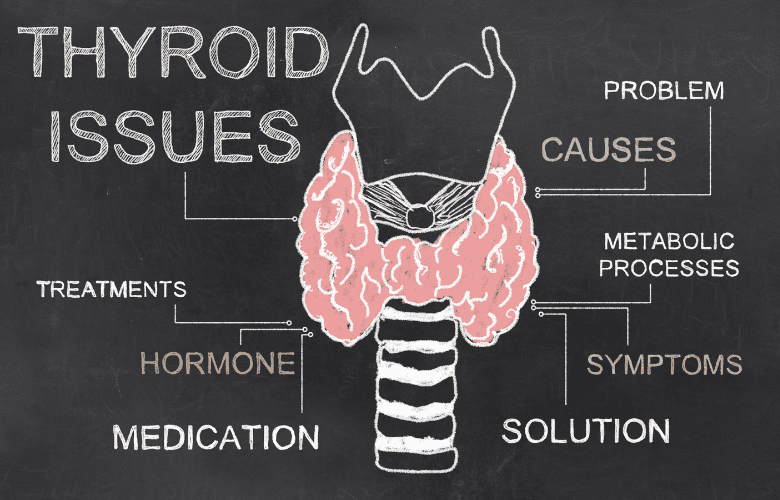Functional Medicine Approach to Hashimoto’s
One disease commonly associated with thyroid health is Hashimoto’s. But, it’s more than just a thyroid issue. Hashimoto’s is an autoimmune disorder, meaning it’s a dysfunction of your immune system. Over time, it misidentifies and destroys your thyroid. Sadly, Hashimoto’s is the leading cause of hypothyroidism or a decrease in your thyroid hormone production. It seldom results in hyperthyroidism or excessive thyroid hormone secretion.
The thing is, your thyroid produces hormones that regulate many of your body functions. These include your metabolism, digestive function, and brain development. Hence, the massive effects of your thyroid hormones are seen throughout your body.
When Hashimoto’s disease and hypothyroidism are left untreated, many complications can occur. These include:
- Goiter
- Heart problems
- High cholesterol
- Mental health issues
- Myxedema coma
Hashimoto’s disease can affect anyone. However, it is more common in midlife women. According to the American Thyroid Association (ATA), women are 5-8 times more likely than men to develop thyroid disease.
Conventional medicine touts thyroid hormone replacement therapy as the only treatment for Hashimoto’s. However, it simply treats low thyroid symptoms. It fails to address the underlying conditions causing immunological dysfunction and tissue damage.
But keep pushing! A qualified functional medicine practitioner can identify the root cause to build a customized treatment for you. The main goal is to heal your thyroid and immune system. It often involves diet therapies and considerable lifestyle changes.
Symptoms of Hashimoto’s Disease
Hashimoto’s often starts undetected. Eventually, symptoms appear and are not unique to the condition. The reduction in thyroid hormones can lead to one or more of the following:
- Dry skin
- Puffy face
- Hair loss
- Brittle nails
- Enlarged tongue
- Constipation
- Weight issues
- Fatigue and sluggishness
- Increased sleepiness
- Muscle weakness
- Joint pains and stiffness
- Slowed heart rate
- Fuzzy thinking
- Poor concentration
- Anxiety
- Depression
- Digestive issue
- Irregular or heavy menstrual periods
Causes of Hashimoto’s Disease
To reiterate, Hashimoto’s is a problem with the immune system. However, it is unclear what causes the immune system to target thyroid cells. Typically, a perfect storm has left the body in a damaged state. The emergence of the disease may be attributed to the following underlying factors:
Genetics & Family History
According to a 2011 study, those with Hashimoto’s disease are more likely to have family members who are also afflicted. Many cases are suspected to be caused by mutations in the human leukocyte antigen (HLA) complex gene family. This gene family helps regulate your immune system. A mutation in one of these genes can lead your immune system to target your thyroid by mistake.
You may likely develop Hashimoto’s disease if it’s in your family medical history. But this does not guarantee you will develop the condition yourself. So, don’t despair!
Gut Health
Your gut aids the immune system in identifying foreign invaders. However, it cannot function well if it is damaged or out of balance due to chronic exposure to drugs, pro-inflammatory foods, or even stress. This can result in a prolonged condition of damage and inflammation, known as “leaky gut,” and can trigger an autoimmune reaction.
Infection
Many viral or bacterial infections, including Borrelia burgdorferi (associated with Lyme disease), have been linked to Hashimoto’s. The condition may lead to molecular mimicry, in which the immune system misidentifies and targets its tissues as outsiders.
Environment
A wide range of environmental factors can affect your thyroid gland. Some are known to interfere with thyroid function. Toxins and radiation, for example, can cause significant stress in your body and trigger autoimmune thyroid diseases.
Other Autoimmune Diseases
Having another autoimmune condition, such as lupus, celiac disease, or rheumatoid arthritis, raises your risk of getting Hashimoto’s. On the contrary, Hashimoto’s also increases your chances of developing these autoimmune disorders.
Functional Medicine Tests for Hashimoto’s
The diagnosis of Hashimoto’s disease can be surprisingly straightforward. The first step is working with a practitioner who insists on doing the right tests. These include:
- Thyroid Stimulating Hormone (TSH) – measures how the pituitary gland (located in the brain) communicates with the thyroid. When it is elevated, it indicates hypothyroidism.
- Free T4 – measures the bioavailable hormone generated by the thyroid gland. T4 deficiency is a sign of thyroid dysfunction.
- Free T3 – In the peripheral tissues, T4 is converted to T3. A low level of free T3, commonly known as the “gas,” can suggest impaired thyroid function or difficulty with conversion.
- Thyroglobulin (TG) and Thyroid peroxidase (TPO) antibodies – TG and TPO and antibodies can help identify underlying Hashimoto’s disease. These antibodies may be elevated and are linked to symptom burden.
Functional Medicine Treatment for Hashimoto’s
What better way to treat Hashimoto than with functional medicine? It recognizes and avoids specific triggers that cause autoimmunity. Plus, it leverages lifestyle strategies to get to the root cause of your issues and heal associated symptoms. These include:
Dietary Changes
Foods to Include for Immune Support and Gut Healing:
- Herbs and spices: mint, thyme, cumin, basil, oregano, turmeric, parsley, rosemary, black pepper, cilantro, coriander, paprika,
- Organic veggies: kale, leeks, yams, anise, carrots, cabbage, bok choy, garlic, lettuce, onions, parsley, rhubarb, squash, spinach, zucchini, kohlrabi, watercress
- Grass-fed, hormone-free, and antibiotic-free meats: lamb, beef, chicken, and turkey
- Ocean-caught fish (with low mercury content): salmon and sardines
- Low glycemic organic fruits: pears, plums, apples, berries, cherries, peaches, apricots, avocados
- Fermented foods: kimchi, pickled ginger, sauerkraut, kombucha
- Gluten-free grains: brown rice, quinoa, rolled oats
Trigger Foods to Eliminate (Inflammatory & gut-damaging foods)
- Grains: corn, barley, bulgur, buckwheat, wheat, spelt, amaranth
- Sugars and sweets: candy, chocolate, maple syrup, molasses, cakes, ice cream, cookies, pastries, sugary cereals
- Seeds and nuts: peanuts, almonds, sesame seeds, sunflower seeds
- High glycemic fruits: mango, raisins, bananas, pineapple, watermelon, canned and dried fruits
- Beans and legumes: peas, lentils, black beans, pinto beans, soybeans
- Dairy products: butter, creams, cheese, cow milk, goat milk, margarine, mayonnaise, whey, frozen desserts
- Soy: miso, tofu, tempeh, edamame, soy milk, soy sauce, soy protein
- Gluten-containing compounds: binders, bouillon, hotdogs, barbecue sauce, teriyaki sauce, condiments, chewing gums, ketchup, emulsifiers, processed salad dressings, MSG
- Beverages: alcohol, soft drinks
Supplements to Support Thyroid (upon practitioner’s recommendation)
- Vitamin A
- B vitamins
- Zinc
- Iron
- Selenium
- Probiotics
- Vitamin D
- Iodine
- Tyrosine
- Magnesium
- Vitamin E
- Adenosine
- Huperzine A
- L-Acetylcarnitine
- Vinpocetine
- Xanthinol niacinate
- Alpha GPC
Quality Sleep & Stress Management
Stress reduces your thyroid function and contributes to inflammation. Your cortisol levels can go up while disrupting other hormone levels in your body, affecting your overall health. Your practitioner can assist you in developing a stress-reduction strategy, which may include restorative exercise, nature time, meditation, and better sleep.
Detoxification
Chemicals in plastics, herbicides, and heavy metals, as well as in cleaning and personal care items, can all impair thyroid function. You must live a low-tox lifestyle to heal from Hashimoto’s. Time to take control! You can choose natural and organic goods and high-quality water and air filters to reduce exposure to these poisons.
Final Thoughts on a Functional Medicine Approach to Hashimoto’s
Hashimoto’s disease can be identified… and reversed! A functional medicine approach that includes proper testing, dietary changes, and other lifestyle adjustments can help your body regain health and balance. Working with a qualified practitioner who will create a treatment plan specifically for you is essential for finding the root cause of your ailment and healing holistically.












